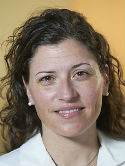| Abstract: |
Background: Perioperative window trials provide an opportunity to obtain intact tumor samples at two different time-points for evaluation of potential surrogate biomarkers. We report results of a pilot trial designed to determine if treatment-mediated changes in gene expression can be detected in formalin-fixed paraffin-embedded (FFPE) samples after 10-d exposure to anastrozole in estrogen receptor (ER)-positive breast cancer compared with untreated controls. Methods: Paired tumor samples (biopsy, surgical) were obtained from 26 postmenopausal women with ER-positive breast cancer. Patients were assigned anastrozole (1 mg/d) for 10 d immediately prior to surgery (13 cases) or no treatment (13 controls). Five hundred two cancer-related genes were examined by the Illumina cDNA-mediated annealing, selection, extension, and ligation, FFPE cDNA array (moderated t-test, P ≤ 0.005). Surrogate biomarkers reflecting changes in gene expression were examined by immunohistochemistry (Wilcoxon rank-based test, P < 0.05). Results: Sufficient RNA was available from 19 paired samples (8 controls, 11 cases). Frozen tissue and FFPE showed good correlation (r = 0.82). Within each group, 18 genes, reflecting roles in proliferation, angiogenesis, and apoptosis, showed differential expression from biopsy to surgery (P < 0.005). Estrogen-related genes were dysregulated in the treated group only. A reduction in Ki-67 was observed in 7 (54%) treated cases and in 1 (7.7%) control patient. Conclusions: 10-d exposure to anastrozole resulted in dysregulation of 18/502 cancer-related genes, and Ki-67 was reduced in 54% of cases. FFPE samples demonstrated good correlation with frozen samples. However, changes in gene expression and increased Ki-67 in the control group suggest local effects of wound healing may represent a confounding factor in the interpretation of perioperative window trials. © 2012 Elsevier Inc. All rights reserved. |
| Keywords: |
immunohistochemistry; adult; clinical article; controlled study; human tissue; treatment response; aged; aged, 80 and over; middle aged; cancer surgery; unclassified drug; multimodality cancer therapy; ki 67 antigen; cell proliferation; ki-67 antigen; dna repair; cd34 antigen; apoptosis; controlled clinical trial; breast cancer; gene expression; gene expression profiling; tumor markers, biological; cullin 2; protein; tumor biopsy; dose-response relationship, drug; angiogenesis; breast neoplasms; cancer hormone therapy; wound healing; gene expression regulation; gene expression regulation, neoplastic; preoperative period; pilot study; pilot projects; oligonucleotide array sequence analysis; cancer tissue; cycline; proliferation; estrogen receptor; anastrozole; postmenopause; frozen section; aromatase inhibitors; antigens, cd34; triazoles; nitriles; complementary dna; cyclin dependent kinase 4; rad51 protein; connective tissue growth factor; cullin; epidermal growth factor receptor 4; protein kinase lyn; paraffin embedding; gamma interferon receptor 1; transcription factor dp1; mixed lineage leukemia protein; aromatase inhibition; preoperative window trials; estrogen receptor positive breast cancer; catechol methyltransferase; bag1 protein; collagen type 18; ing1 protein; integrin linked kinase; mel protein; prg protein; protein fos; rad23a protein; rap1gds1 protein; transcription factor e2f5; transcription factor fosb; transcription factor junb
|








